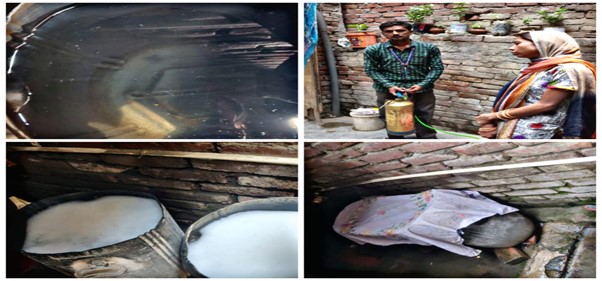In this scenario, we have a situation where a field worker from the EMBED Project of Family Health India, Meerut (Uttar Pradesh) named Sonika visits a slum called Lallapura Nai Basti in Meerut. During her visit, she discovers two large containers of water that are filled with mosquito larvae. Recognizing the potential danger of mosquito-borne diseases, Sonika takes the initiative to counsel the family living there about the risks associated with mosquito breeding sites and urges them to remove the water from the containers and place them in a dry area.
However, the family faces a challenge as there is no available dry area to empty the containers, and the containers are too heavy to move. In response, Sonika contacts her supervisor for assistance. After consultation, the District Malaria Officer is informed about the situation. The District Malaria Officer then contacts the Urban Malaria Officer to take appropriate action.
The Urban Malaria Officer orders one of their field workers to get in touch with the EMBED BCCF for further action. The Urban Malaria Officer decides to address the issue by spraying larvicidal treatment within the containers to eliminate the mosquito larvae. This approach aims to prevent the further development of mosquitoes and mitigate the risk of mosquito-borne diseases.
A field worker from the malaria department arrives at the house where the larvae were found, equipped with larvicidal treatment. The malaria staff member sprays the larvicidal treatment inside the containers, which will effectively eliminate the mosquito larvae. The family is instructed to empty the containers after three days.
In addition to the larvicidal treatment, the EMBED BCCF, along with the malaria staff, takes the opportunity to educate the family on proper water storage practices. They demonstrate how to cover the containers with cloth, which helps prevent mosquitoes from laying eggs in the water. This educational effort not only addresses the immediate issue of mosquito larvae but also empowers the family with knowledge to protect themselves from future risks.
Ultimately, the collaborative efforts of the various team members from EMBED, the malaria department, and the family result in successfully preventing the potential threat of deadly mosquito-borne diseases and improving the health and well-being of the family in the slum area.
